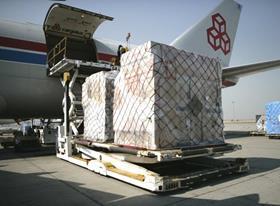
President Trump’s decision to impose strict travel restrictions on flights from Europe to the US in a bid to slow the spread of coronavirus could have a major impact on the movement of airfreighted fruits and vegetables and other perishable cargo, industry experts said.
The new rules, which go into effect at midnight on Friday, ban all passenger flights from the 26 European states in the Schengen area for a 30-day period. They do not include services from the UK and Ireland.
Cargo-only flights are not included in the restrictions. But the airfreight trade between Europe and North America is dominated by passenger aircraft.
On Friday, Trump tweeted: 'Please remember, very important for all countries & businesses to know that trade will in no way be affected by the 30-day restriction on travel from Europe. The restriction stops people not goods.'
But figures from cargo data provider WorldACD show more than 60 per cent of the airfreight that moves between Europe and the US travels on passenger flights, well above the worldwide average.
The ban is widely expected to lead to a significant reduction in airfreight capacity and push shipping rates up. A similar ban by the Trump administration on flights from China is early February caused a 27 per cent rise in airfreight rates from China to the US between 24 February and 9 March, according to the TAC Index as flight capacity was cut by more than a third.
Ole Schack Petersen, senior vice-president and chief strategy officer at LCL and Broom Group said the drop in capacity would be felt not only in transatlantic trade but also on other routes.
“With fewer planes in the air, it will also affect China-Europe routes. Some fresh produce will have to move ocean freight where possible,” he told Fruitnet.
Schack Petersen said large freight forwarders like DSV-Panalpina and K&N are employing more cargo planes than before to make up for the reduced space offered by the commercial airlines.
UK-based perishable cargo company PML said one solution could be for fruit and vegetables suppliers to send airfreighted perishable cargo via the UK.
“We recognise the major concerns this will cause for so many of our clients but for us it is very much business as usual,” said PML’s sales director, Nick Finbow.
“European companies, or companies with a European base that are looking to send their goods to the US can forward their cargo to the UK and we will seamlessly send the consignment onto the US.”
Similarly, the company said it could receive European-bound cargo scheduled to return from the US into the UK, undertake all the necessary customs clearance checks and deliver to the desired European destination.
However, Schack Petersen expressed doubts on the efficacy of this solution. “I don’t think that would work. The US is focused and able to detect origin of product, so if EU exporters or UK companies tried to circumvent this, it could have a severe effect on their future ability to trade with the US,” he said.
Trump’s move puts even more pressure on an industry already struggling because of the coronavirus outbreak. Iata, the global airline trade body, warned that the crisis could cost the industry up to US$113m in lost revenue this year.



